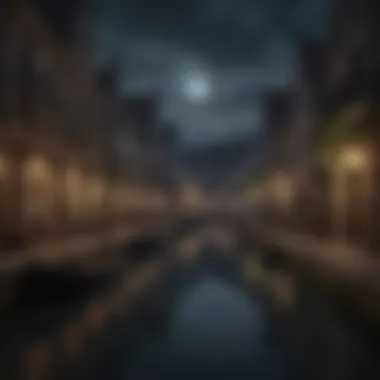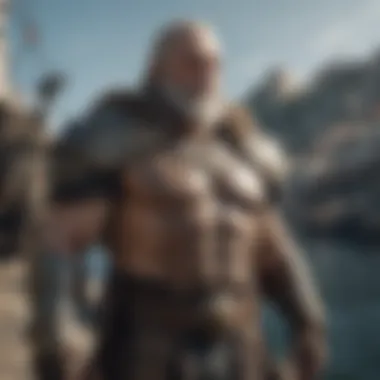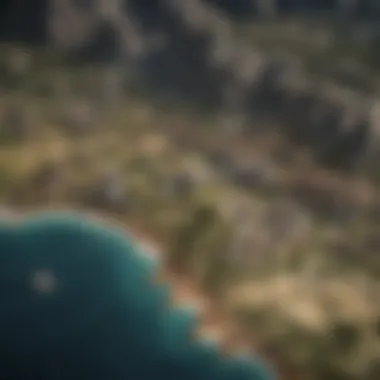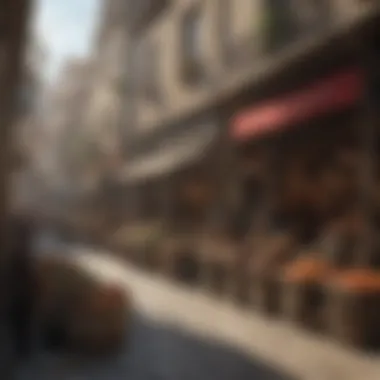Exploring the Intricacies of Braavos in Game of Thrones


Intro
The city of Braavos stands as one of the most fascinating locations in the Game of Thrones universe, rich in history and complexity. It dares to differ from the other cities across Westeros with a distinctive cultural and economic identity. Situated at the edge of the Narrow Sea, it serves as a crucial hub for trade and politics. Understanding Braavos requires a deep dive into its intricate details, the characters who inhabit its streets, its historical significance, and the cultural elements that shape its identity.
With its unique customs, political maneuvers, and the towering Iron Bank, Braavos plays an essential role in influencing many key storylines within the series. This article aims to unpack these elements, providing insight into how this coastal city shapes the narrative arcs of various characters and the larger context of the Game of Thrones saga. Readers will explore character analyses, thematic explorations, and the nuances that make Braavos an integral part of this captivating world.
Prelims to Braavos
Braavos is a city shrouded in mystery and significance within the realm of Westeros in the Game of Thrones universe. It serves as a symbol of autonomy and economic power, deeply influencing not just the fate of its own citizens but also the wider narrative fabric of the series. In this section, we will explore its geographical positioning and historical context, providing a foundation for understanding its pivotal role in the storyline.
Geographical Context
Braavos is located on the western coast of Essos, surrounded by the Shivering Sea. Its unique geography features a series of islands and canals that offers both natural beauty and strategic advantages. The layout of the city is notable for its distinct architecture, which often reflects a melting pot of cultures due to its position as a trade hub.
The canals serve as the primary method of transportation, not unlike the famous canals of Venice. Majestic buildings, such as the House of Black and White, tower above the water, depicting the city’s deep historical roots and commitment to secrecy. This geographical setup not only facilitates trade but also protects the city from external threats.
Historical Overview
Braavos was established centuries ago by the escaped slaves of Valyria, marking it as a city built on the ideals of liberty and independence. Its founders, driven by a desire to create a sanctuary from oppression, paved the way for the city's rich and tumultuous history. Over the years, Braavos evolved into a powerful center of commerce, rivaling even the great Free Cities of Essos.
The Iron Bank of Braavos emerged as one of the most influential financial institutions in the world, signaling the city's economic prowess. Through time, various ruling bodies controlled Braavos, yet it retained a fiercely independent spirit, making decisions that often went against the influence of larger powers. This history creates a context where Braavos is not only a backdrop for the story but also an active participant in the political and economic dramas that unfold in Game of Thrones.
Braavos exemplifies a city that thrives on its unique beliefs, strong economy, and independent spirit, making it a crucial player in the Game of Thrones narrative.
Understanding Braavos' geographical uniqueness and historical depth allows us to appreciate its complex role and significance within the broader universe. As we continue exploring its cultural aspects and key locations, the foundations established here will significantly enrich our analysis.
The Significance of Braavos
Braavos holds a pivotal position in the world of Game of Thrones, with its unique blend of economic prowess and political independence. Understanding these elements is essential for grasping how Braavos influences events throughout the series. This section will explore Braavos's wealth, its astonishing banking systems, and its remarkable political status, providing insights into why this city is so fundamentally important in the broader narrative.
Economic Power
Braavos is often seen as the financial powerhouse of Westeros. The city is home to the Iron Bank, which is considered the most powerful financial institution in the realm. This bank plays a crucial role in funding various political factions and their ambitions. Although many characters seek its assistance, not all are met with success. Characters like Stannis Baratheon seek the bank's wealth in their quests, underscoring the significance of financial resources in shaping power dynamics.
The economic system of Braavos is highly sophisticated. Unlike other city-states in Westeros, Braavos operates on a system of loans and interest, which is one of the reasons it maintains stability and growth over centuries. This system allows for remarkable investments in industries like shipbuilding and fishing, leading to the city's impressive fleet and trade networks. The role of the Iron Bank goes beyond mere economics. It acts as a political player in itself, influencing the decisions and actions of numerous key figures in the series.
Additionally, Braavos's strategic location allows it to control trade routes that are vital to the economy of Westeros and Essos. This geographical advantage ensures that profits from trade flow back to the city's coffers, further enhancing its reputation as an economic titan. As this rich economy fuels the ambitions of various characters, it significantly impacts the unfolding narrative surrounding power and wealth.
Political Autonomy
Braavos is distinct among the Free Cities due to its unwavering political autonomy. Unlike many regions in Westeros that are often caught in the throes of power struggles and territorial conflicts, Braavos operates independently of any outside influence. This political freedom allows the city to maintain its unique systems and governance, which are guided by a council known as the Sealord and the Twelve. This internal structure enables Braavos to craft its destiny without the weight of external pressures.
This autonomy has shaped the city's character significantly. The Braavosi people pride themselves on their independence, which is reflected in their customs and laws. Their rejection of the Iron Throne's authority further emphasizes their political stance. This independence occasionally puts Braavos at odds with more powerful forces in the region, making it a potent player in local and international politics.
Moreover, Braavos's dedication to safeguarding its sovereignty enhances its status as a refuge for those escaping tyranny from various corners of the world. This inclusive political atmosphere creates a diverse society where myriad beliefs and cultures coexist, enriching the city’s cultural fabric, which will be explored in further sections.
Braavos's significance in the Game of Thrones universe is not confined merely to its wealth. The city's autonomy and strategic banking system weave together a tale of independence, power, and the often intricate dance of politics that defines the series.


Cultural Aspects of Braavos
Cultural aspects of Braavos play a critical role in understanding its place within the Game of Thrones narrative. The city is not just a physical location but a melting pot of traditions, beliefs, and influences from various regions. This contributes to the depth of the story and introduces a contrasting location to Westeros. The rich cultural backdrop is reflected in Braavos’ architecture, art, and community interactions. It serves as a reminder of the complexities of human society and the ongoing interactions among diverse populations. By delving into the cultural aspects, one can appreciate the depth of the characters and the motivations that drive them within this unique setting.
Diversity and Multiculturalism
Braavos stands as a beacon of diversity, home to an array of cultures, languages, and ethnicities. This multiculturalism is not merely a surface-level trait; it serves foundational roles in the city's identity. Merchants from Lys, Oldtown, and beyond inhabit the city's bustling markets, creating an environment brimming with variety. Languages such as Valyrian and Common Tongue echo in its streets, reflecting the city's vibrant tapestry.
- Cultural Festivals: These celebrations are essential in showcasing the traditions of various ethnic groups. Events like the Festival of Masks allow people to express their identities while sharing in a communal experience.
- Art and Architecture: The design of buildings in Braavos ranges from grandiose palaces to simple stalls. This variety embodies the city's history as a refuge for those escaping oppression.
- Cuisine: The food in Braavos is another testament to its diversity. Dishes from different regions can be found, illustrating the blending yet preserving of unique cultural heritages.
"Braavos is more than a backdrop; it's a living entity formed by the lives, dreams, and histories of its people."
This intricate diversity not only enhances the narrative aspect of Game of Thrones but also allows for rich character development that authenticates their stories.
Religious Beliefs
Religion in Braavos embodies a spectrum of beliefs that influence daily life and the societal framework. The key religion is the worship of the Many-Faced God, a representation of death. This faith reflects fear, fascination, and respect for mortality.
- The House of Black and White: This structure serves as the center for the worship of the Many-Faced God. It attracts individuals seeking guidance or wishing to train in the arts of assassination.
- Diverse Faiths: Alongside the Many-Faced God, other belief systems thrive within the city. There are practitioners of the Faith of the Seven and followers of the Old Gods. This plurality illustrates a broader acceptance of spiritual practices, promoting coexistence.
- Rituals and Practices: The rituals performed in this multicultural context reflect both local traditions and external influences, creating a unique spiritual landscape.
The religious practices of Braavos contribute not only to its cultural richness but also impact the characters throughout the series. The interplay between these beliefs often drives pivotal plot points, influencing decisions and alliances.
Understanding the cultural aspects of Braavos is crucial for grasping its significance in the larger narrative of Game of Thrones. It highlights how diverse heritages intersect and shape the identities of its inhabitants.
Key Locations in Braavos
Braavos is a city of significant importance in the Game of Thrones universe. It stands out due to its unique landmarks and locations that reflect its cultural, economic, and political aspects. Each key location serves as a narrative device, deepening the understanding of the city and its role in the larger story. This section will explore the notable spots: The Iron Bank, The House of Black and White, and The Great Canal. Each contributes distinctly to the identity of Braavos and provides insights into its function within the wider context of Westeros.
The Iron Bank
The Iron Bank is arguably the most powerful financial institution in the known world. It symbolizes the immense economic clout that Braavos wields. The importance of this bank is profound, as it finances wars, businesses, and rulers alike. Its influence reaches beyond the borders of Braavos, affecting the very fabric of the political landscape in Westeros.
The bank operates on a strict code; its motto, "The Iron Bank will have its due," highlights its relentless pursuit of repayment. This characteristic demonstrates not just the power of money but also the potential consequences for those who default on their loans. The Iron Bank is led by shrewd individuals like Tycho Nestoris, whose dealings reflect the cutthroat nature of commerce in Braavos.
"In Braavos, money holds as much sway as steel, often more."
The concept of credit, debt, and interest plays a pivotal role in the narratives of both the Lannisters and the Targaryens. By understanding the operations of The Iron Bank, one gains insights into the financial dynamics that can shift allegiances and fuel conflicts in Westeros.
The House of Black and White
The House of Black and White stands as a temple dedicated to the Many-Faced God. It serves both as an enigmatic structure and as a central point for the Faceless Men, an order of assassins. This location is rich with mystery and depth, revealing the cultural and spiritual dimensions of Braavos.
Inside the house, the lines between life and death blur. The Faceless Men are known for their philosophy that life is not sacred. This contrasts sharply with other belief systems in Westeros, making it a unique aspect of Braavos. The House’s architectural beauty signifies the city's wealth and artistic heritage.
Those who enter the House of Black and White undergo a transformative experience. They are educated in the art of death, where identities are relinquished for a higher purpose. This theme of loss and gain resonates deeply with characters like Arya Stark, reaffirming that the journey through Braavos is one of self-discovery and moral questioning.
The Great Canal


The Great Canal is the lifeblood of Braavos, connecting various parts of the city and facilitating trade and transportation. Its construction reflects the city's advanced engineering and ingenuity. The canal allows Braavos to thrive economically, serving as a vital artery for incoming goods and services.
The presence of this extensive waterway enhances the city’s strategic importance. It also allows Braavos to maintain its autonomy, as it is harder to besiege a city that is surrounded by water. The canal serves not just a practical function but also a symbolic one; it represents the interconnectedness of commerce and culture in Braavos.
Influential Characters from Braavos
Braavos, a key city in the Game of Thrones universe, is shaped not only by its geography and culture but also by its influential characters. These figures embody the unique experiences and philosophies present in Braavos, offering readers insights into the city's complex dynamics. The portrayals of individuals such as Jaqen H'ghar and Tycho Nestoris reveal the gray moralities of the world. Their actions and decisions influence not just their fates but also those of primary characters throughout the series.
Here are specific aspects to consider when exploring the influential characters from Braavos:
- Character Depth: Each character represents particular ideals or social commentary that enriches the narrative.
- Plot Catalyst: They often serve as catalysts for major events or shifts in the story.
- Cultural Reflection: Their backgrounds and motivations reflect Braavos’ diverse cultural identity and complex society.
Understanding these characters helps to underscore Braavos’s role as a crucial setting in the wider story of Westeros.
Jaqen H'ghar
Jaqen H'ghar is a mysterious figure whose influence reverberates throughout the narrative. As a Faceless Man, he embodies Braavos's commitment to a distinct and often elusive moral code. His character challenges traditional notions of identity, life, and death, which are central themes in the series. This element of Jaqen's character is vital for several reasons:
- Transformation and Identity: Jaqen’s ability to change faces suggests the complexities of identity. This notion resonates with Arya Stark, whose journey of self-discovery is heavily influenced by her interactions with him.
- Philosophical Questions: His dialogue often raises philosophical questions about justice and revenge, leading viewers to ponder deeper moral implications.
"The many-faced god does not demand your pity. He demands the gift of your silence."
Jaqen’s enigmatic nature makes him an essential character through which the ideas of fate and free will are explored, particularly in relation to Arya's personal growth.
Tycho Nestoris
Tycho Nestoris, another prominent figure from Braavos, offers a straightforward yet compelling exploration of the banking and economic aspects of the city. As a member of the Iron Bank, his character provides crucial insight into the power dynamics of Western politics.
- Financial Influence: Tycho's actions as a banker illustrate the immense power money holds in the realm. The Iron Bank's sway over governments and military powers shows how economics drive many political decisions in Westeros.
- Diplomatic Maneuvers: He navigates complex political waters, positioning himself as an intermediary. His dealings with various factions highlight Braavos’s unique position in the socio-economic landscape.
Nestoris serves as a reminder of the often-overlooked role of counsel and financial strategy in warfare, making his character vital to understanding both Braavos's influence and the overall geopolitics of the series.
Braavos in the Wider Context of Westeros
Braavos stands as a key player in the geopolitical landscape of Westeros and the Free Cities. As a unique entity, this city not only influences its immediate surroundings but also interacts with several other regions and powers. Understanding the role of Braavos in this wider context enriches comprehension of its significance in the story.
Relations with Other Free Cities
Braavos shares dynamic relationships with other Free Cities. These cities, while independent, often view each other as rivals or allies based on economic and political tides. For example, the close proximity of Braavos to cities like Pentos and Lys allows for trade and cultural exchanges. Such interactions impact the ebb and flow of wealth and power in the region.
In the trade network, Braavos possesses an enviable position, primarily due to the Iron Bank. This institution provides financial support to those in power, thus enabling alliances or promoting rivalries. Other cities frequently seek the favor of Braavos, often negotiating treaties or pacts to secure economic advantages. Key aspects include:
- Economic Influence: The Iron Bank's lending creates dependencies among borrowers.
- Cultural Exchanges: The diverse populace fosters mutual influence in customs and traditions.
“Braavos is often the first stop for merchants looking to extend their commerce, making it a bustling hub.”
This interconnectedness underscores Braavos as a vital hub, ensuring its relevance in broader political maneuvering.


Impacts on Political Strategies
The political strategies originating from Braavos have reverberated throughout Westeros. Leaders and factions from various regions often seek the approval of the Iron Bank. This is particularly true in times of conflict or change, making financial backing crucial for many claimants.
Moreover, the House of Black and White represents a unique political element. It serves not just religious purposes but can also influence political decisions by inacting a powerful element of fear and control. This duality highlights how Braavos can wield significant political power, directing the actions of states from behind the scenes.
A few impactful aspects include:
- Influence Over Decisions: Major players must consider Braavos’s stance on various issues.
- Shifts in Alliances: Economic support can change the allegiances of houses or cities.
In summary, Braavos does not exist in isolation. Its relationships with other Free Cities and its underlying influence on political strategies make it an integral part of the Westeros narrative. Understanding this context allows fans to better appreciate the web of connections that define this vibrant city.
Narrative Contributions of Braavos
Braavos holds a significant position in the Game of Thrones universe, not merely as a backdrop but as a critical catalyst for character evolution and storyline progression. Its unique blend of cultures, beliefs, and political structures contributes to its narrative importance. The complexity of Braavos often reflects the moral and ethical dilemmas faced by the characters it influences. Understanding Braavos helps in comprehending its role in shaping crucial events and character arcs, thus enriching the overall narrative.
Influences on Main Characters
Several key figures in Game of Thrones are directly influenced by their connections to Braavos. For instance, Arya Stark encounters Braavos in her quest for identity and vengeance. Her time at the House of Black and White significantly alters her worldview and her ability to confront challenges. Not only does Arya learn the art of assassination, but she also grapples with her own sense of morality. This tension between her original upbringing and the merciless teachings in Braavos is a theme that runs deep through her journey.
Another character, Tycho Nestoris, symbolizes the economic potency of Braavos. As a representative of the Iron Bank, he carries the weight of financial power, showcasing how Braavos' influence reaches into the heart of political strategies throughout Westeros. His interactions with characters like Stannis Baratheon demonstrate the balance of power that money can create, impacting royal decisions and alliances.
Plot Developments Originating from Braavos
Plot points that stem from Braavos weave through the larger tapestry of the Game of Thrones narrative. The Iron Bank emerges as a pivotal entity, often affecting the fate of various houses. For instance, Lannisters and Baratheons both seek funding from this bank, which leads to conflicts arising from the pressure to repay debts.
Moreover, the House of Black and White is crucial in shaping Arya's story arc, opening pathways for her to become a formidable character. The training she undergoes not only transforms her into an assassin but also introduces the concept of identity versus duty, a central theme explored in the series.
In summary, Braavos serves as a rich source of influences that resonate through character development and plot dynamics. The city is more than a mere setting; it continually reminds characters and viewers alike of the multifaceted implications of power, identity, and morality in the Game of Thrones universe. As such, the contributions of Braavos are both profound and lasting.
"Braavos challenges perceptions of morality and power, leaving an indelible mark on key characters and plot trajectories."
Understanding these narrative contributions illuminates how Braavos helps shape the series as a whole, offering a nuanced perspective on its significance in Westeros.
End: The Lasting Legacy of Braavos
Braavos stands as a distinctive entity within the Game of Thrones narrative. Its complex tapestry of history, politics, and culture significantly enriches the overall story. This section encapsulates why Braavos matters, reflecting on its influence in the series and its legacy that extends beyond the pages of the books or the screen of the shows.
Cultural Contributions to Game of Thrones
Braavos is not merely a backdrop; it offers a vibrant cultural landscape that is integral to the narrative. The city's diversity plays a crucial role in shaping character arcs and thematic elements. For instance, the Iron Bank of Braavos symbolizes financial power and the intricacies of debt, influencing the actions of key characters like Stannis Baratheon. Furthermore, the unique customs and rituals, such as those found in the House of Black and White, serve to highlight the themes of death and identity. These aspects reinforce the overarching theme of power and morality that permeates the series.
💬 "Braavos reminds us that power can take many forms, from the sword to the coin."
The cultural depth of Braavos not only captivates the audience but also provides a plausible framework for the characters’ conflicts and motivations. As a haven for outcasts and a crossroads for various cultures, it reflects real-world complexity and the balancing act of coexistence, inviting viewers to ponder deeper societal questions.
Implications for Future Narratives
As we consider the legacy of Braavos, its implications for future narratives in the Game of Thrones universe gain prominence. The character dynamics developed in Braavos can be revisited in new stories, potentially allowing for fresh explorations. For example, the influence of characters like Arya Stark is bound to have ongoing relevance. Arya's evolution under the teachings of the Faceless Men raises questions about identity and purpose—topics that could be explored in possible spinoffs or sequels.
Moreover, the economic and political significance of Braavos suggests a fertile ground for narrative expansion. The city’s role as a financial powerhouse presents numerous storytelling opportunities related to ambition, power struggles, and ethical dilemmas. Future narratives can reflect on how Braavos remains a pivotal player behind the scenes, continuing to shape the destinies of other characters across Westeros.
In summary, Braavos is not just a historical footnote within the Game of Thrones series; it establishes a lasting legacy that fosters cultural richness and proposes intriguing avenues for future explorations. Its cultural contributions and implications ensure that it remains a significant element for both current fans and those who may delve into new dimensions of this captivating universe.



